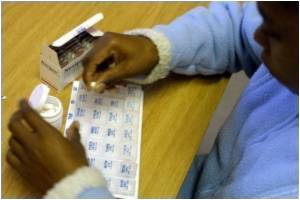
The findings were hailed as "significant" by Anthony Fauci, the director of the National Institute of Allergy and Infectious Diseases (NIAID), which carried out the study.
"Those who took the drug on 90 percent or more days had 72.8 percent fewer HIV infections," Fauci told AFP.
The study was conducted among 2,499 men, including 29 transgendered women, between the ages of 18 and 67 who were sexually active with other men but were not infected with the virus that causes AIDS.
Known as the iPrEx HIV Prevention Study, the research was carried out from July 2007 to December 2009 in six countries -- Brazil, Ecuador, Peru, South Africa, Thailand and the United States.
Participants were selected at random to take a daily dose of Truvada -- a combination of 200 milligrams of emtricitabine and 300 milligrams of tenofovir disoproxil fumarate -- or a placebo.
Advertisement
All participants were given counselling on preventing the spread of the virus as well as condoms and medical care for other sexually transmitted diseases during the course of the study.
Advertisement
Of those, 36 were recorded among the 1,251 participants given Truvada and 64 among the 1,248 who had been given a placebo, showing that the drug reduced the risk of infection by 43.8 percent.
"This discovery alters the HIV prevention landscape forever," said Jim Pickett, director of advocacy at the AIDS Foundation of Chicago.
"While this level of efficacy is relatively strong, PrEP is not quite ready for prime time and work remains before this strategy is rolled out," he added.
"However, we are thrilled to have a new prevention option beyond male and female condoms visible on the horizon."
NIAID sponsored much of the study, with additional funds provided by the Bill and Melinda Gates Foundation. California-based Gilead Sciences, which makes Truvada, donated the drugs used in the study.
Those who carried out the study were concerned that participants would be less cautious, thinking they were protected by the drugs, but instead the subjects reported increased use of condoms and fewer sexual partners.
Ian McGowan, one of the principal investigators of the Microbicide Trials Network, cautioned that while the results were encouraging, backup methods were still needed.
"The data from the iPrEx study are encouraging but the less than ideal adherence rate to oral PrEP clearly show that we need additional prevention approaches such as rectal microbicides that could be used by men and women at risk of HIV infection through unprotected receptive anal intercourse," he said.
Gay men are one of the most at-risk groups for HIV in the United States, accounting for more than half of the 56,000 new infections each year.
One in five gay men living in 21 major US cities is infected with HIV and nearly half are unaware of it, the Centers for Disease Control and Prevention (CDC) said in a study published in September.
The New York based amfAR, The Foundation for AIDS Research, also hailed the results but noted that the prime targets of the study were high-risk men who have sex with men, so further study was needed to assess other groups, such as injection drug users, female sex workers, or heterosexual women and men.
The US-based Centers for Disease Control said more trials are under way to test the effectiveness of PrEP for injection drug users and heterosexuals, and those should show results "in the next few years."
Source-AFP















